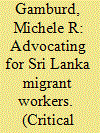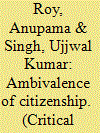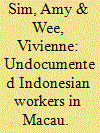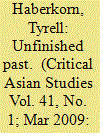|
|
|
Sort Order |
|
|
|
Items / Page
|
|
|
|
|
|
|
| Srl | Item |
| 1 |
ID:
087033


|
|
|
|
|
| Publication |
2009.
|
| Summary/Abstract |
Nearly a million Sri Lankan women labor overseas as migrant workers, the vast majority in the Gulf Cooperation Council (GCC) countries in West Asia. They are poorly paid and vulnerable to a wide variety of exploitative labor practices at home and abroad. Despite the importance of worker remittances to Sri Lanka's national economy, and in spite of the nation's history of organized labor and active political participation, migrants have received only anemic support from the state, labor unions, feminist organizations, and migrant-oriented nongovernmental organizations. The article contextualizes Sri Lankan migration within larger-scale economic dynamics (such as global capitalist policies and processes) and local-level ideological formations (such as local political histories and culturally shaped gender norms). The author argues that political freedoms in destination countries have a significant effect on organizing activities in both host and sending nations. Comparing the Sri Lankan and Philippine situations, the author contends that the vibrant activism in the Philippines correlates with the liberal organizing climates in the European Union and in East and Southeast Asia, while the paucity of organizing in Sri Lanka correlates with the strict repression of guest workers in the GCC. Compared to other destinations, the GCC countries give workers (particularly women) less chance for autonomous activities, are less open to labor organizing, and are less responsive to political protest.
|
|
|
|
|
|
|
|
|
|
|
|
|
|
|
|
| 2 |
ID:
087032


|
|
|
|
|
| Publication |
2009.
|
| Summary/Abstract |
The code of citizenship marks out the "other," continually reproducing and re-inscribing it through legal and judicial pronouncement in a relationship of contradictory cohabitation. The relationship is, however, not one of exclusion or simple opposition, but rather that of forclusion, where the outsider is present discursively and constitutively in delineations of citizenship. This article examines the manner in which the process of forclusion unfolded in the delineation of citizenship in Assam, in northeastern India, in particular in the contests around the Illegal Migrants Determination by Tribunal Act [IMDT] of 1983, and the complex reconfiguration of political forces and power relations between the Center and the state of Assam on the question of definition and identification of illegal migrants. The authors examine the contests over the IMDT Act, in the context of the elections in Assam in 1983, the Assam Accord of 1985, and the Supreme Court Judgment in August 2005 striking it down. They show how the illegality/alien-ness of the migrant became central to the construction of the Assamese identity in the 1980s and how the illegal migrant and the IMDT Act figured in precarious relationships of consensus and antagonism depending on the nature of political/electoral contests between the Center and state governments.
|
|
|
|
|
|
|
|
|
|
|
|
|
|
|
|
| 3 |
ID:
087035


|
|
|
|
|
| Publication |
2009.
|
| Summary/Abstract |
As capitalist globalization has intensified in recent years, academic studies of international labor migration have gained significance. Studies have shown how globalization has increased the extent of labor migration and how it has greatly affected the lives of migrant workers. Few studies, however, have documented how migrant workers collectively resist capitalist globalization. By collaborating with migrants from different countries, migrant workers have created transnationalism from below, vehemently challenging capitalist globalization. This article focuses on the development of the Asian Migrants' Coordinating Body (AMCB) in Hong Kong to illustrate how grassroots migrant organizations resist capitalist globalization. Most studies of Hong Kong as a "site of transnational activism" overlook the unique importance of grassroots migrant organizations and their distinctions from migrant nongovernmental organizations (NGOs). The AMCB is particularly interesting and important not only because it is the first coalition of migrants from different Asian countries but also because it is a coalition of grassroots migrant organizations from several nationalities. By focusing on the AMCB, this article analyzes how migrant workers from the Philippines, Indonesia, Thailand, Nepal, and Sri Lanka have worked together across nation-state, racial, and gender boundaries. This article describes the AMCB's origins and achievements and asks what makes the AMCB possible and what lessons in grassroots transnationalism are to be gleaned from the AMCB's efforts and its relationship with NGOS.
|
|
|
|
|
|
|
|
|
|
|
|
|
|
|
|
| 4 |
ID:
087041


|
|
|
|
|
| Publication |
2009.
|
| Summary/Abstract |
Migrant domestic workers rarely take part in - let alone organize - public protests in the countries where they work. Public protests are virtually unheard of among migrant domestic workers in Singapore, Taiwan, and Malaysia, and especially in the Middle East and the Gulf States. Over the past decade and a half, however, migrant domestic workers in Hong Kong - mostly Filipinas and Indonesian women - have become highly active, organizing and participating in political protests. Hong Kong's migrant domestic workers protest in a place where they are guest workers and temporary migrants, denied the opportunity of becoming legal citizens or permanent residents. Increasingly, these workers, their grassroots activist organizations, and the nongovernmental organizations with which they are affiliated frame their concerns in terms of global, transnational, and human rights, not merely local migrant worker rights. This article takes the "Consulate Hopping Protest and Hall of Shame Awards" event - part of the anti-World Trade Organization protests in Hong Kong in 2005 - as an ethnographic example of domestic worker protest and as an entr e through which to ask what it is about Hong Kong and about the position of women migrant workers - whose mobility and voice is both a product and a symptom of globalization - that literally permits public protests and shapes their form and content. The article illustrates how migrant workers' protests and activism have been shaped by domestic worker subjectivities, by the dynamics of inter-ethnic worker affiliations, and by the sociohistorical context of Hong Kong as a post-colonial "global city" and a "neoliberal space of exception."
|
|
|
|
|
|
|
|
|
|
|
|
|
|
|
|
| 5 |
ID:
087034


|
|
|
|
|
| Publication |
2009.
|
| Summary/Abstract |
In the last five years, interest among civil society actors in the issues migrant domestic workers face in Singapore has exploded. Nongovernmental organizations (NGOs), informal networks, and faith-based groups have all formed to address the needs and interests of these workers. Most of these organizations are welfare-oriented, providing support services, training programs, and social networking opportunities. Some engage in advocacy and research activities. This latter group has lobbied successfully for important changes in how female migrant workers are recruited into and deployed within the domestic labor market. To date, their activities have been focused at the local level through their engagements with the Singaporean government, employment agencies, and employers. This orientation, however, has recently begun to change as they seek to develop transnational networks and support regional and international campaigns. This article examines the reasons behind this interest in cross-border organizing through detailed case studies of two advocacy-oriented NGOs, Transient Workers Count Too and the Humanitarian Organisation for Migration Economics. The article explains that although a "transnational imperative" has begun to shape the activities of these two NGOs, they have different motivations for engaging beyond the border. By revealing a diversity of forms and meanings associated with the processes of "scaling up," this article contributes to the broader scholarly understanding of the complex nature of transnational organizing and challenges earlier studies that assert that transnational activism is a necessary and natural outcome of migrant worker organizing.
|
|
|
|
|
|
|
|
|
|
|
|
|
|
|
|
| 6 |
ID:
087042


|
|
|
|
|
| Publication |
2009.
|
| Summary/Abstract |
Presenting new research findings on undocumented Indonesian migrant workers in Macau, this article explicates the dovetailing arrangements between public and private sector interests that are systemically creating undocumented labor migration flows. It then shows how these arrangements are structurally inherent in the mutual competitiveness of globalizing nodes of wealth creation. Undocumented migration cheapens production costs and results in a flexible black market of vulnerable, right-less, and exploited workers. Contrary to illusions of an urbanizing Asia with expanding spaces for civil liberties, the development of globally competitive megacities, built and supported by low-skilled migrant workers, rests on a global underclass of transient workers who bear the human costs of transience and labor flexibility, enabling megacities to externalize such costs and enhance their global competitiveness. The article analyzes the vulnerabilities of undocumented Indonesian workers in the context of Macau's rapid economic development as an aspiring megacity The Macau government's laissez-faire tolerance of such workers is grounded in its need for human labor that is abundant, cheap, marginal, and disposable. The flow of Indonesian migrant workers into Macau is linked to Hong Kong's exclusionary immigration policies, which aim at extricating surplus migrant labor. Meanwhile, the Indonesian government refuses responsibility for its migrant workers in Macau because Macau is not recognized as an official destination. The article shows how public and private interests motivate increasing numbers of migrants to become undocumented overstayers in Macau, as they try to avoid oppressive practices in labor migration from Indonesia and the exclusionary policies of Hong Kong.
|
|
|
|
|
|
|
|
|
|
|
|
|
|
|
|
| 7 |
ID:
087031


|
|
|
|
|
| Publication |
2009.
|
| Summary/Abstract |
This article examines the struggle for land tenancy reform and the assassination of Farmers' Federation of Thailand (FFT) leaders in northern Thailand during the period of democratic politics between 14 October 1973 and 6 October 1976 as unresolved, ambiguous, and linked events in the recent Thai past. During the 1973-1976 period, farmers became new political and legal subjects as they fought to pass and then implement the 1974 Land Rent Control Act. Drawing on provincial archival records, the author contextualizes how and why tenancy became a contentious issue between farmers and landlords beginning in the 1950s and then examines the anxious and violent backlash with which their organizing in the 1970s was met by state, para-state, right-wing, and landholding elites. The author interrogates the conditions and effects of the assassinations by writing about the life and death of one of the leaders of the FFT, Intha Sribunruang. The denials by a range of state officials of the political nature of Intha and other FFT leaders' murders underscore both the importance of the FFT's work and the necessity to critically evaluate the assassinations. The author concludes by arguing that the lack of resolution surrounding the struggle for tenancy reform and the assassinations of FFT leaders continues to resonate in present-day politics. An Appendix to the article offers the first English-language list of the FFT leaders known to have been killed or victimized by violence between 1974 and 1979.
|
|
|
|
|
|
|
|
|
|
|
|
|
|
|
|
|
|
|
|
|